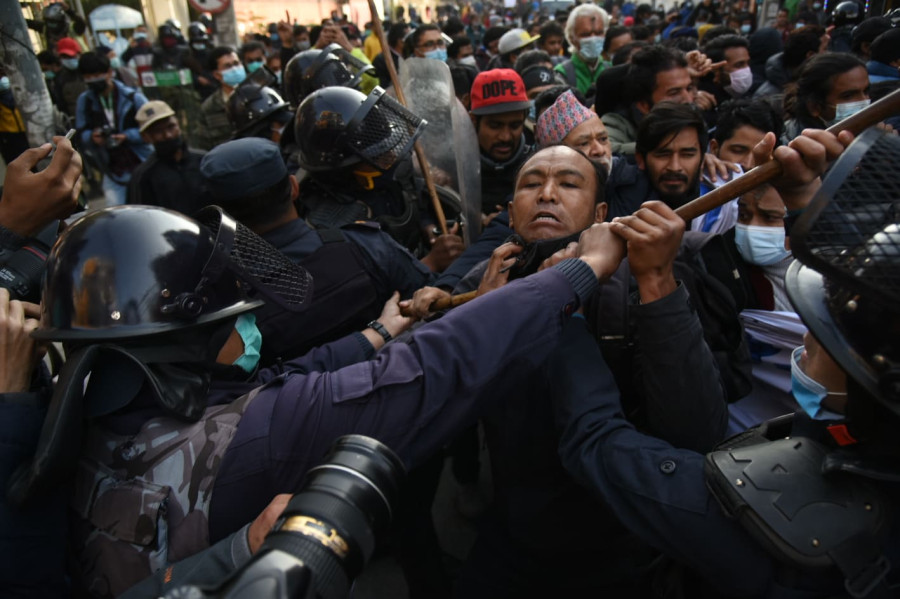Editorial
Do not suppress dissent
The attack on citizens' peaceful protests is unacceptable in a democracy.
First things first. The Oli administration cannot derogate from its primary obligation to respect and protect the constitutionally guaranteed right of citizens to assemble peacefully without arms. Article 17 (2) (b) of Nepal’s constitution guarantees that every citizen has the freedom to assemble peaceably and without arms. Nepal is also party to the 1996 International Covenant on Civil and Political Rights, Article 21 of which governs the right of peaceful assembly. It is, therefore, the government’s duty to comply with and implement these national and international legal frameworks envisioned to ensure civil and political freedom in accordance with the inalienable rights of citizens.
As the primary civil agency for law enforcement, the Nepal Police is also required by law to recognise and protect these human rights; but as is evident in their actions, time and again, the institution has miserably failed to develop a conscience that they must protect the rights of people rather than serve the interests of the government. The failure to function as should a police force in a democracy has tarnished the Nepal Police’s image, lowered the morale of diligent officers and eroded public confidence in the institution. Under every leadership, past and present, the Nepal Police has earned a reputation for repressing civil and political rights, often using brutal force, which has injured and even killed people.
This begs the question: Who does the Nepal Police serve?
History is full of damages wrought by intolerant administrations and their ironclad hold on the police force, which has failed to reform itself and adapt to more democratic forms of policing. On Monday, the police used water cannons and batons to disperse a peaceful civic protest led by prominent citizens against the House dissolution move, which has drawn strong condemnation from all quarters of society. Reminiscent of past police suppression of peaceful protests, the police baton-charged the protesters and used water cannons to disperse them as they marched towards the prime minister’s official residence in Baluwatar.
Over a dozen protesters have been injured, six of them critically and who are receiving treatment. Photojournalists were also not spared while documenting the scuffle. Five photographers sustained injuries when they were targeted by the police, according to the Photojournalists’ Club. This blatant attack by the Oli administration on citizens’ fundamental rights using excessive police force against peaceful assembly is unacceptable in a democracy and must stop. The leadership at the Nepal Police also needs to understand that although the institution is an arm of the state, its foremost duty is to uphold the law and abide by it. It should do better than partner with the government, which is charting undemocratic territories by openly suppressing the right to dissent and branding all opposition as anti-national forces.
With its uncalled for admonishments, the Oli administration has become increasingly intolerant of democratic values and the rule of law, as was evident from the early days when the government tried to ban peaceful assembly and curb the hard-won freedom of citizens. Nepal’s constitution, promulgated by an elected assembly, guarantees the fundamental right to freedom of expression and opinion, and the right to peaceful assembly. They are indispensable values in a democracy. It does not bode well for the government when it misuses the police to suppress citizens and strangle democratic norms, for state repression on non-violent resistance will only boost the incentive to fight back.
Both the government and the Nepal Police must be held accountable for their abuse of power and disregard for the law. Civic dissent and demonstrations, the Oli administration must understand, are mass grievances against its undemocratic attitude. Shockingly, the leadership which was once at the receiving end of police brutality has morphed from champions of democracy to a totalitarian regime. It is imperative that this arrogance is kept in check to ensure that democracy survives because that’s how a democracy functions.




 13.12°C Kathmandu
13.12°C Kathmandu














